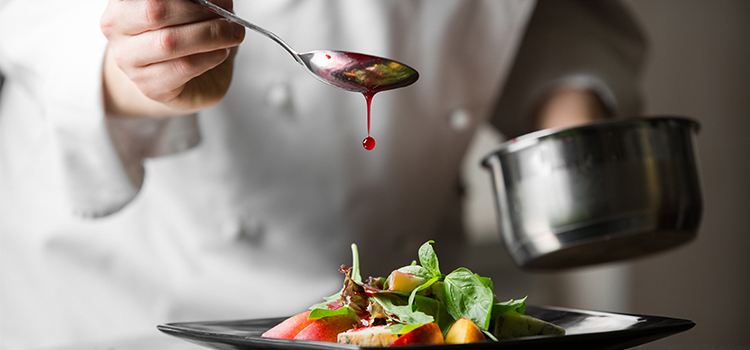A Professor's Advice About Culinary Schools
Get the inside scoop on culinary schools from a teacher's perspective.

Candice Deis
Professor at Quality College of Culinary Careers
Fresno, CA
Chef Candice Deis almost became Dr. Candice Deis. But somewhere along her path towards medical school, she realized that her true love was in food preparation. "I started learning how to cook when I was 4 years old from my grandmother," Deis said. "And I always said if I don't become a doctor, I'll become a chef." A year into pre-medicine, she transferred to California Culinary Academy in San Francisco.
After a whirlwind career as a chef at a restaurant and then a resort, Deis opened a restaurant and started her own catering business. Today, she's an instructor. Here are her thoughts on what prospective students should think about when they apply to culinary schools.
What does it take to succeed in culinary schools?
A passion for cooking is a must. Some people come in already knowing a thing or two about cooking, but we really like students who are eager to learn and have a passion for this. You need to be creative and artistic. You've got to visualize food and be able to decorate. Also, accept that this is a very physically demanding industry. When you're in school, you're very busy. It's a lot of work and a lot of time.
Do culinary school students also work while they're studying?
Yes, many students have day jobs, and they attend our evening program that runs from 3:30 p.m. to 10:30 p.m. We are flexible with students' schedules if they have to work.
What's the job market like in the culinary arts?
If you get a culinary chef certification, your job title would probably be prep cook, line cook or lead line cook. To get past that to sous-chef or executive chef jobs, which pay more, you must pursue a degree in culinary arts. Many of our students already work as prep cooks and are studying to obtain their Associate of Occupational Studies degrees in the evening program. We always try to help students get jobs. We have a list of places looking to hire, and we recommend our students to places and people we know. If a student is worth claiming, we'll claim them and give them good letters of recommendation.
How are classes graded in culinary schools? What classes are there?
We use a combination of attendance, quizzes, projects and lab. Lab grading is composed of professionalism, work ethic, and sanitation and safety.
Students take classes in supervisory management, nutrition, culinary math, culinary arts, melon carving and dining room etiquette. Every month we focus on a different cuisine and put together a buffet from that country. Sometimes, we cook food from our own region. This month, for example, we're doing a Southern style BBQ. Students also learn baking and pastries, which is one of the specialties of our school.
How long does it take to get a culinary degree?
In our program, it takes one year to get the culinary chef certification and seven-and-a-half months to get the AOS degree.
What's the atmosphere of the school like?
It's like a big family, and we're all very caring. We have four instructors and about 50 students, ranging in age from straight out of high school to over 60 years old. I've often set students up with jobs when they graduate. I've set up many students with jobs at Fresno State University, where sororities and fraternities are looking for cooks. I also have my own catering company on the side. Instead of hiring regular staff, I'll hire students to work for me.
Our class sizes are small. We have about three to ten students per class, which means more time with individual instructors. We also have a restaurant attached to our school called the California Bistro and Grill that is student run and operated. Students work there for 15 weeks and rotate through five different stations where they learn a variety of techniques and practices.
What should a student consider when choosing culinary schools?
Look at what the school offers as a package. How is the class schedule? How many instructors do they have? How much will it cost? Consider how big the school is. The smaller the program, the more hands-on experience you get with the instructor, and this is really important. I suggest picking the instructor's brain when you're working with them. All of us have different specialties and expertise.
Culinary Arts Schools & Careers
- A Professor's Advice About Culinary Schools
- Chef Interview: An Inside Look at Chef Jobs
- Chef Job Description
- Chef Job Outlook
- Choosing a Culinary Arts Program
- Compare Culinary Careers
- Cooking School Student Profile
- Culinary Arts Salary Information
- Culinary Arts Schools Offer Career Help
- Culinary Externships Equal Work Experience
- Culinary School and Career Resource Center
- Find Local Cooking Classes to Fit Your Goals
- Helpful Resources for Culinary Careers
- Is Culinary School Worth the Time and Tuition?
- Jobs for Chef School Graduates
- Recreational Cooking Classes
- Top 10 Essential Cooking Tools
- What is Culinary School Really Like?
FIND A CULINARY SCHOOL TODAY
Tell us a little about yourself and we'll connect you with schools that offer culinary arts programs.
